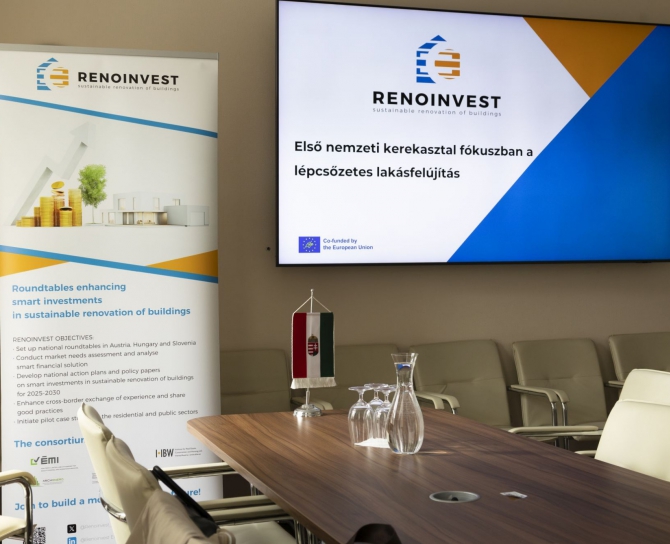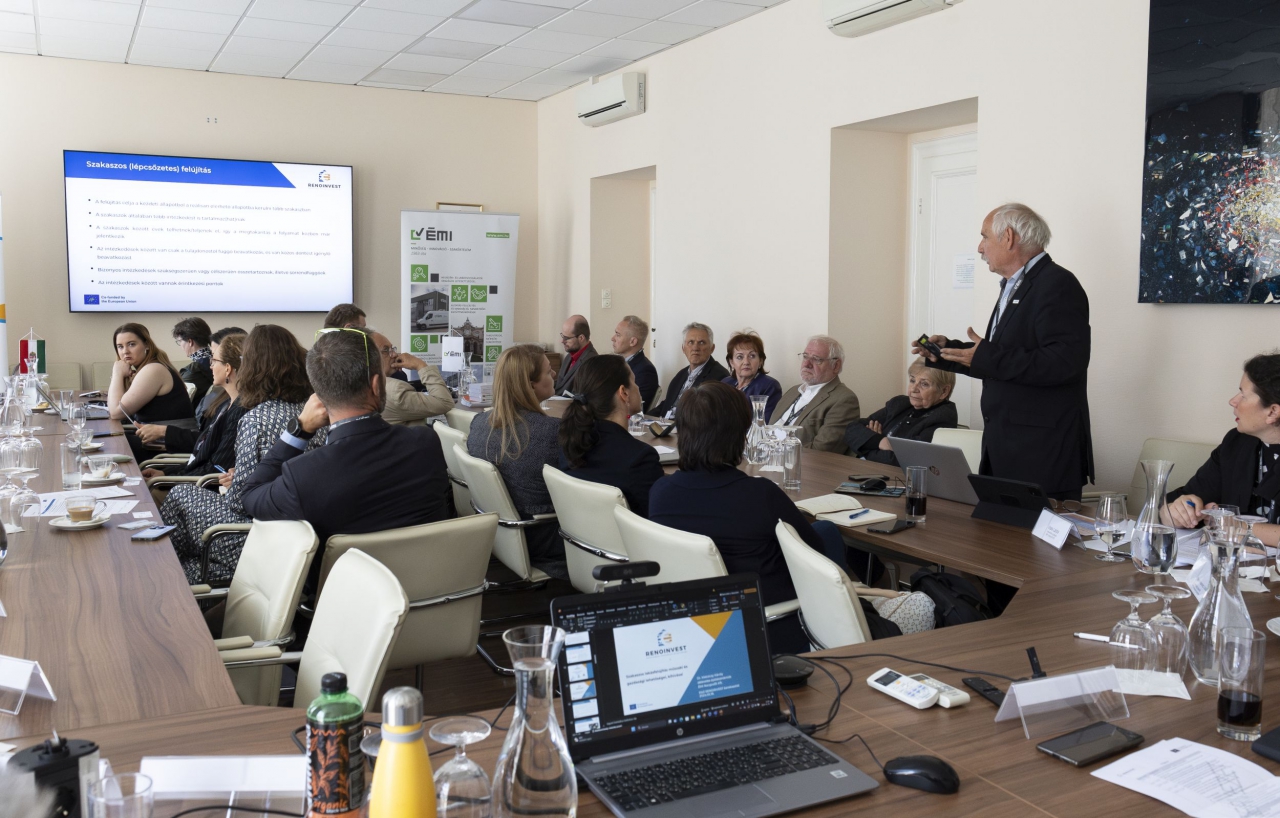
To achieve the building energy and climate goals set by European Commission for 2030 and the full decarbonization target by 2050 as part of the European Green Deal, the wider application of energy efficiency and integrated renewable energy sources is essential. One challenge in financing residential building renovations is the inclusion of various other financial market instruments.
The Renoinvest project, co-financed by the LIFE Program, aims to promote extensive professional discourse to overcome these challenges. The professional roundtable held at the Hungarian Banking Association on May 16, 2024, was the first event, with several similar events to follow before the project's conclusion.
Dr. Anita Terjék, a senior scientific associate at ÉMI, presented the EU's residential building energy and climate goals and the necessary measures to achieve them. Currently, 80% of Hungarian housing stock was built before the 2000s, and about three-quarters of these have outdated energy performance. The new EPBD (Energy Performance of Buildings Directive - 2024/1275/EU), adopted in April 2024, is crucial on the path to energy savings. The directive aims to increase the rate of renovations, especially for buildings with the poorest energy performance, supports better air quality, digitization of building energy systems, and the development of infrastructure for sustainable mobility. It emphasizes requirements for new buildings, the necessity of renovating existing building stock, and the introduction of financial incentives and integrated financing sources for phased deep renovations to meet these goals.
Dr. Károly Matolcsy, a certified architect and senior scientific associate at ÉMI, highlighted the economic significance of home renovations and the possibilities of phased renovations in his presentation. He pointed out that the renovation process should be carried out in various stages, each comprising multiple measures. These processes form part of a long-term building renovation plan aiming for investments to be profitable and self-financing. Dr. Matolcsy emphasized that phased renovations are an effective solution for both condominiums and single-family homes. He illustrated the advantages, such as better planning and predictability for owners and lower lending risks for banks, with concrete examples. Energy-efficient building renovations are crucial for both owners and the state. He stressed the importance of smart metering, which allows for precise measurement of savings, and the integration of digitization systems that can lead to further energy savings.
Gábor Szarvas, president of the Hungarian Green Building Council (HuGBC), presented the Retrofit Hub EU project, which aims to develop and compare concepts for the energy-efficient renovation of condominiums and bring together stakeholders interested in renovations. He emphasized that renovation should be a planned and thoughtful decision, considering both financial and non-financial factors, as well as technical and financial decisions. Establishing the correct order, monitoring, and planning is important. The Retrofit Hub project's results and the Condominium Renovation Manual are available at https://retrofithub.eu/hu/.

The presentations provided a solid professional foundation for the panel discussion and workshop.
The discussion was led by Ildikó Rajné Adamecz, financial expert of the Renoinvest project, representing the Archenerg Cluster. Participants included Ádám Dulfalvy, product development manager, K&H Group; Réka Hámori, chief economist, Hungarian Banking Association; Dr. Ernő Nagy, director, Fundamenta-Lakáskassza Zrt.; Dr. Gyula Nagy, managing director, MBH Mortgage Bank; Gábor Szarvas, president, Hungarian Green Building Council; Szilvia Szilber, condominium manager, Szilber Ltd.; and Lajos Vass, development director, ÉMI Nonprofit Ltd.
An animated panel discussion took place among experts familiar with the challenges of residential buildings and various aspects of building renovations (technical, financial, and legal). Participants emphasized the importance of renovating the building stock, noting that building energy-efficient homes alone is not enough to protect the planet. Comprehensive, plan-based renovations are essential, requiring professional consensus with measurable and documentable results.
The participants agreed that collaboration among stakeholders and the creation of a well-thought-out, comprehensive, and long-term predictable program are essential for the success of energy-efficient home renovations in Hungary, focusing on both single-family homes and condominiums. Technical planning and implementation, reliable data collection, and the integration of financial support and loans are crucial for successful renovation programs. A well-designed program could reduce national energy consumption and stimulate the economy, particularly important now for the construction sector. This could lead to significant energy savings for households and increased lending for banks, benefiting all parties involved. The establishment of "one-stop shops" can help owners make energy-efficient decisions and develop renovation plans.
The professional event concluded with a workshop where participants shared their experiences and suggestions on phased renovation, financing options, data collection, and measuring energy savings. Discussions highlighted the need to promote energy efficiency through building renovations, requiring joint efforts in many areas (e.g., awareness-raising, legislative changes, development of financial incentives). The Renoinvest project aims to continue facilitating professional discourse, resulting in proposals to advance the financing of building renovations.
The event presentations can be accessed via the following link:
Dr. Terjék Anita, ÉMI Nonprofit Kft. Residential building energy and climate goals
Dr. Matolcsy Károly, ÉMI Nonprofit Kft. tudományos főmunkatársa - Step-by-step residential renovation: technical and economic opportunities and challenges
Szarvas Gábor (HuGBC) - Step-by-step residential renovation: technical and economic opportunities and challenges
Additional useful professional materials on the subject are also available for download:
Construction Energy Efficiency Guide – What to pay attention to when building or buying a home?
